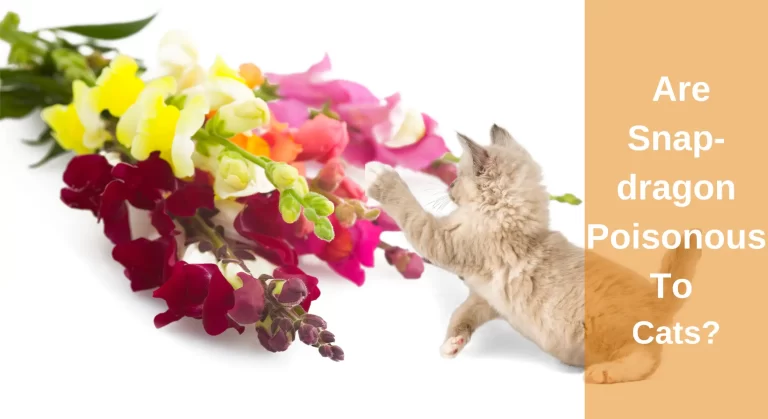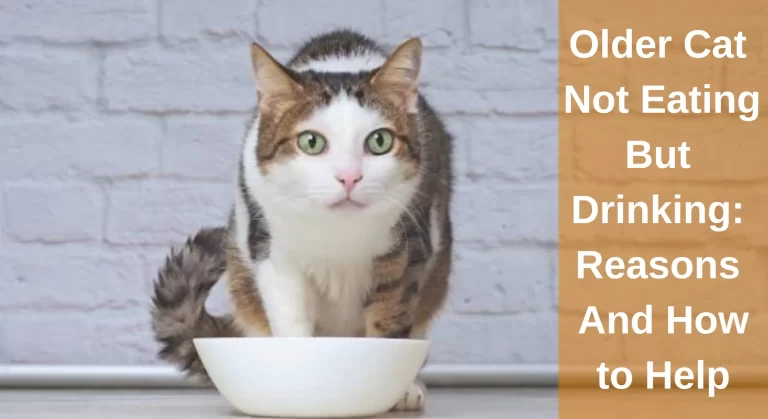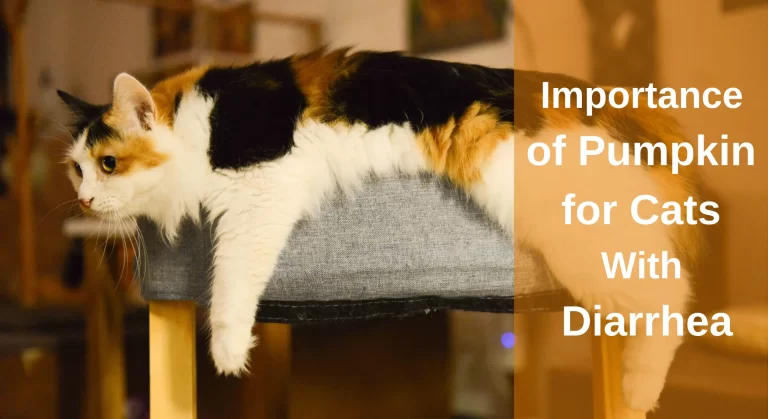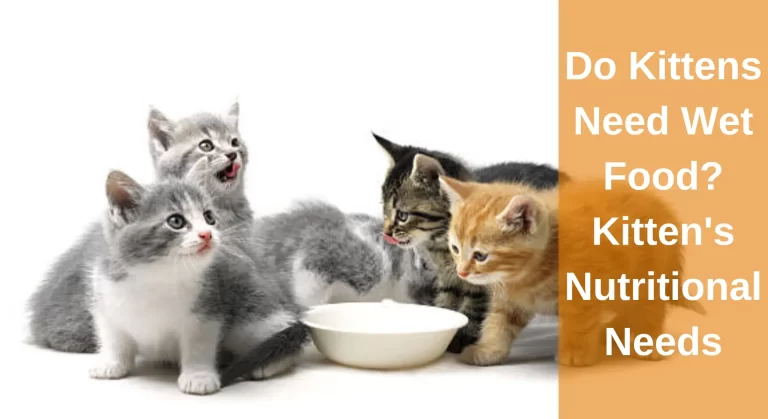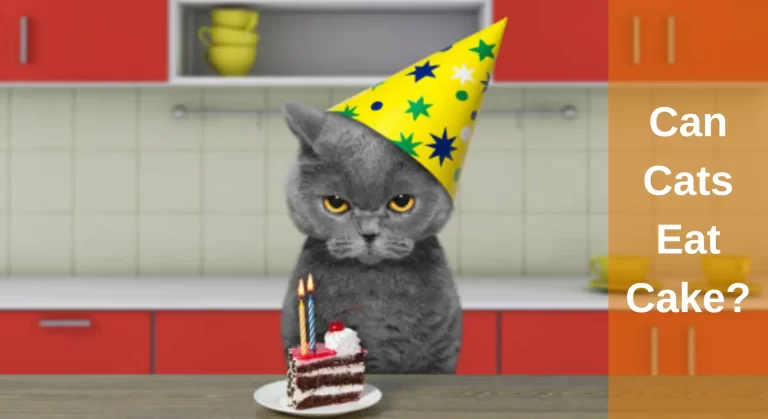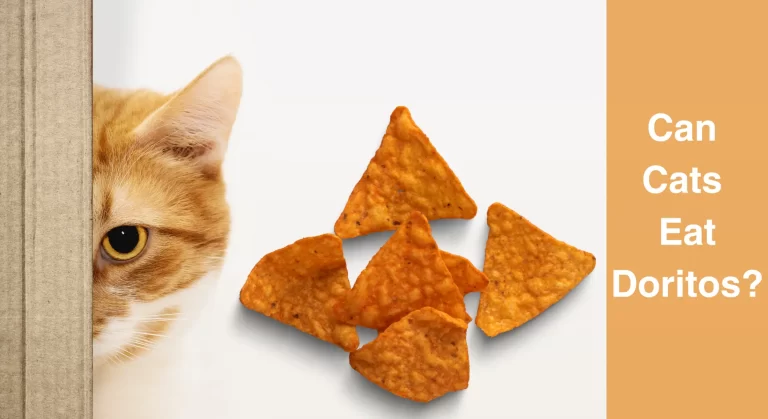Can Cats Have Whipped Cream? What Happens If Cats Eat Whipped Cream?
Although it is allowed for cats to eat whipped cream, this does not mean they ought to. Whipping cream does more harm than good to cats.
Can Cats Have Whipped Cream? Frequently, whipped cream causes harm to cats. Cats in good health could, under exceptional circumstances, be able to tolerate tiny amounts of whipped cream.
Searching for a healthy alternative snack is therefore preferable as fatty contents are not so good for her/him. Cats’ bodies can’t handle dairy, sugar, or other such substances as humans can. Most of the ingredients in whipped cream are toxic to cats. Cats lack the receptors that allow humans to appreciate sweet foods like whipped cream.
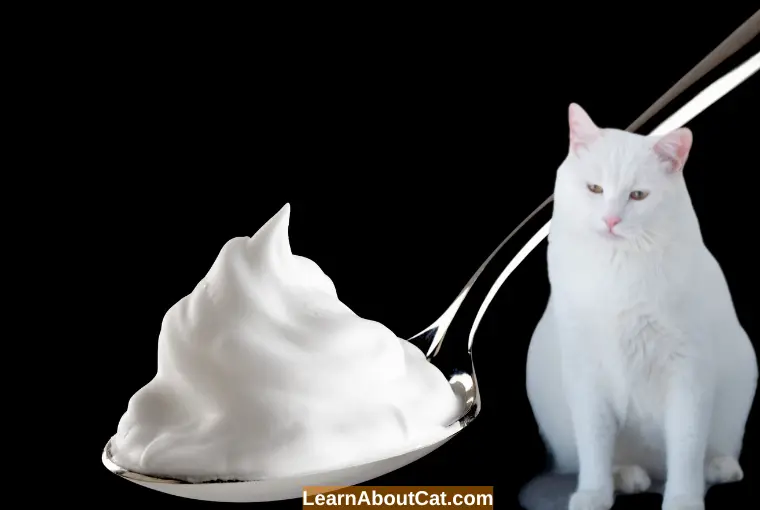
How Bad Is Whipped Cream for Cats? Is Whipped Cream Bad for Cats?
Yes, Whippet is detrimental to cats for the following reasons:
Most cats suffer from lactose intolerance, as this may cause various problems, including diarrhoea and upset stomachs since the digestive system cannot process dairy.
Since lactose intolerance affects both people and cats, in the same way, the best solutions are to find replacements and refrain from consuming dairy. Only a few dairy products contain sugar lactose, like cheese, milk, and whipped cream. Lactose is a sugar that people without lactose intolerance can digest, but cats with illnesses cannot.
You must continue with caution because the great majority of cats are lactose intolerant. Dairy products may not be digested by cats who eat it, causing their stomachs to ferment and release gas. The cat will experience extreme flatulence and stomach ache as a result of the excessive gas.
Water can enter the cat’s intestines through the unprocessed sugar lactose, which can cause diarrhoea. Whipping cream has additional elements that might be damaging to its health, even if a cat doesn’t have a lactose sensitivity. Because it has far more fat than conventional milk, the cream is bad for cats. So, cats wouldn’t get much nutrition from whipped cream.
Sugar is also included in whipping cream, which is terrible for cats. Sugar does not usually appear in a cat’s diet; hence, it will harm their health. Sugar has the same adverse effects as lactose, including nausea and vomiting. Sugar can also cause diabetes and damage to cats’ teeth.
Corn syrup, which functions similarly to sugar in cats, is typically included in whipped cream products. Corn syrup can cause blood sugar fluctuations in diabetic cats, which can be quite dangerous. Other brands of whipped cream could include xylitol or other artificial sweeteners, which can fluctuate cats’ blood sugar.
Also Read: Can Cats Eat Vanilla?
Is it Safe to Serve Whipped Cream to Cats?
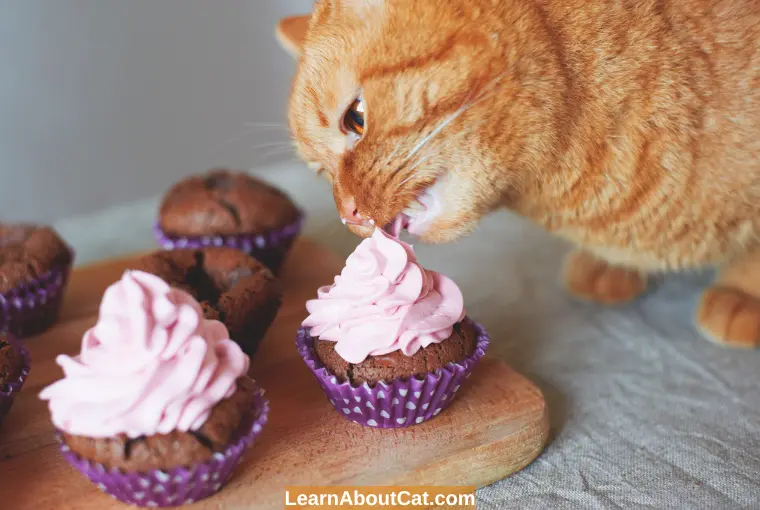
If you want a quick answer to the question, “Can cats eat whipped cream?” then the answer is yes. Cats are allowed to eat anything they choose, and many of them like the rich, buttery flavour of cream.
It would be best for owners to find out if the whipped cream is safe for cats. In the grand scheme of things, cats can usually consume whipped cream without any problems. It doesn’t include anything that will cause our animal friends’ stomachs to become really upset, and they can usually handle it fairly well. They also like how creamy it tastes!
However, whipping cream isn’t really a healthy meal. As carnivores, cats should consume meat primarily, yet sometimes treating them to cream as a treat won’t cause any severe harm. As a result, cats should only occasionally have whipped cream in moderation as part of a nutritious, balanced diet.
Also Read: Can Cats Eat Cake?
What Makes Whipped Cream off Limits for Cats? Why Cats Should not Eat Whipped Cream?
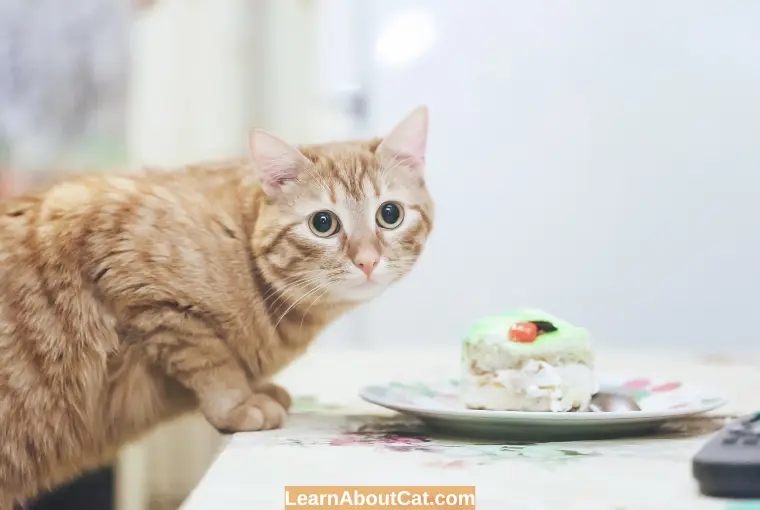
Whipping cream isn’t really healthy or wise, but you may occasionally offer it to your cat. Cats are actually harmed by it for all of the following reasons:
Whipping cream contains lactose, which cats cannot digest. Furthermore, it contains components like sugar, corn syrup, and artificial sweeteners that might have an impact on your cat’s blood sugar, making it difficult for diabetic cats to consume.
The sugar and fat content of whipping cream may be a factor in obesity and excessive weight gain. Whipped cream also contains other ingredients that cats shouldn’t eat since they can be harmful or cancer-causing.
Here is a deeper look at every justification for not serving whipped cream to your cat.
1. Whipped Cream has a High Sugar Content
In most recipes, a lot of sugar is added to make the cream taste sweeter and more delicious. Like cream, sugar may be consumed by cats, but should they? Once more, the answer is no. Sugary meals send signals to our brains, asking us to keep eating more and more. Our tongues include two essential proteins that make this feedback mechanism work. When these protein receptors bind to the sugar molecules, our brains are alerted that the food we ingest has the required nutrients.
However, cats can not taste sugar they lack the receptor for sweetness. If a cat consumes a high-sugar diet, it might vomit, have diarrhoea, and feel uncomfortable. The severity of the symptoms depends on the cat’s sensitivity. Additionally, sugar consumption can lead to weight gain, diabetes, tooth decay, and other health problems over time.
2. Whipped Cream Contains Carrageenan
Carrageenan, which is also a component of most commercial whipped creams, is the next element we’ll talk about. Food ingredients like carrageenan are used to regulate textures. It’s an emulsifier that keeps the whipped cream smooth and enjoyable by preventing it from separating. Prior to recently, carrageenan was present in pet diets. However, because it is a carcinogen, exposure to high levels of it may cause cancer. As a result, efforts have been made to remove it from pet food.
3. Whipped Cream Contains Lactose
Whipping cream is made from cream, a more viscous portion of milk that eventually separates from milk. If you choose whole milk, you will see a thicker, somewhat darker material at the top. Cream, please! Nevertheless, most cream is extracted and sold separately.
Therefore, the cream contains lactose, just like milk and other dairy products.
Lactose is the main carbohydrate in whipping cream and all other dairy products. However, unlike simple carbohydrates like glucose, lactose has to be digested by an enzyme called lactase. Because most cats are unable to produce enough lactase, they are unable to digest dairy products properly.
4. Whipped Cream Contains a Lot of Calories
There are many calories in whipped cream. As was already said, it contains a lot of sugar. Given their size, they must have a high caloric density, as evidenced by this. Twenty calories or so are in one teaspoon of sugar. Although it might not seem like much, ready-made whipped cream from the shop includes a lot of sugar.
In addition to its sugar content, whipping cream also includes fat. Actually, the amount of fat in whipped cream accounts for around 76% of the total macronutrients.
5. Whipped Cream Contains Nitrous Oxide
Last but not least, the produced whipped cream that is sold in cans contains nitrous oxide.
Nitrous oxide, sometimes known as laughing gas, is routinely used as an anaesthetic at the dentist to make you feel more comfortable. People who overdose on nitrous oxide may feel dizzy, have trouble moving around, and make bad decisions. The consequences are uncertain, but given that cats are smaller than dogs, it would take less nitrous oxide for the symptoms to appear in cats.
Can I Occasionally Offer Whipped Cream to My Cat?
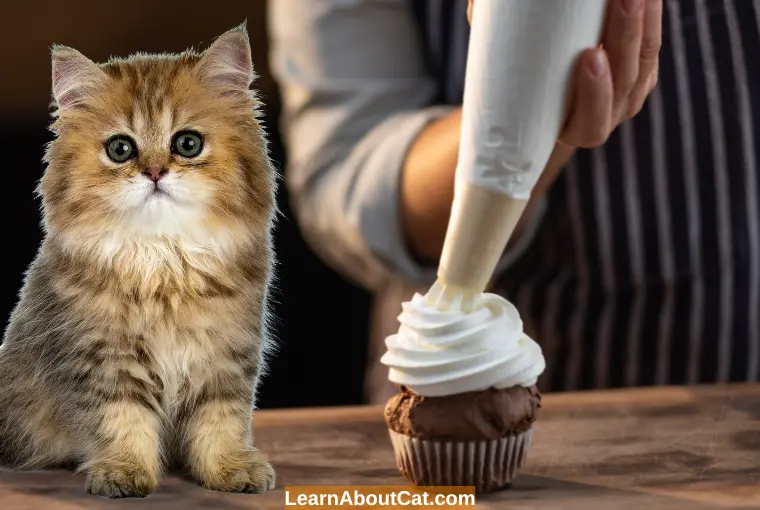
Giving whipped cream to cats is not appropriate since it is more harmful than helpful to their health.
Whipping cream includes dairy as well as sugar and vanilla flavours. Although none of these substances is toxic to cats, they all have the potential to cause your cat’s stomach to have issues. Whipping cream has other elements besides dairy products, such as vanilla extract, that may harm healthy cats. Despite not being an essential component of their diet, sugar cannot be consumed by cats.
They risk damaging their pancreas, getting diabetes, and becoming overweight if they consume too much or too frequently. Sugars are not effectively excreted from their bodies and are instead quickly stored as fat in their bodies. Although ethyl alcohol makes up around 34% of vanilla extract, vanilla does not hurt cats. Too much of this can be harmful to felines. The best option is to avoid offering your cat whipped cream since so many delicious and healthy substitutes are easily accessible.
How Does Eating Whipped Cream Affect Cats?
A cat will experience more gas than usual for a few hours after eating a modest amount of whipped cream, but then it should be OK. Cats are cunning animals. Be prepared if your cat jumps up on the counter to sneak a few whipped cream sips. Be prepared for some vomiting or diarrhoea if you know your cat suffers from severe lactose intolerance. Giving your cat whipped cream is not a good idea, even if they don’t appear to be lactose intolerant.
What are the Symptoms of Lactose Intolerance in Cats?
Since most cats are lactose intolerant, this is the key factor contributing to whipped cream’s unfavorable effects on felines. If they ingest dairy, they could display any of the following symptoms:
- Diarrhea
- Vomiting
- Flatulence
- Abdominal pain
Lactase is a digestive enzyme that breaks down sugar into smaller molecules so that it can pass through a cat’s stomach without harm. Without it, these sugars won’t dissolve. As a result, your cat can have unpleasant intestinal issues. Yes, whipped cream fits into this as well.
A cat should be alright unless drinks it regularly or excessively. However, even a small amount of lactose might result in digestive issues, which is something you don’t want. It is advisable to take no chances since dehydration from severe diarrhoea may occur.
Interesting Reading: Can Cats Drink Milk? Are Cats Lactose Intolerant?
How to Respond if a Cat Consumes a Gulp of Whipped Cream and Symptoms Appear?
When cats consume whipped cream in small amounts, they might become gassy for a few hours. Despite the fact that whipped cream isn’t fatal to cats, it still contains ingredients that have a bad reaction with your cat and can lead to serious stomach problems.
The Importance of a Healthy Cat Diet
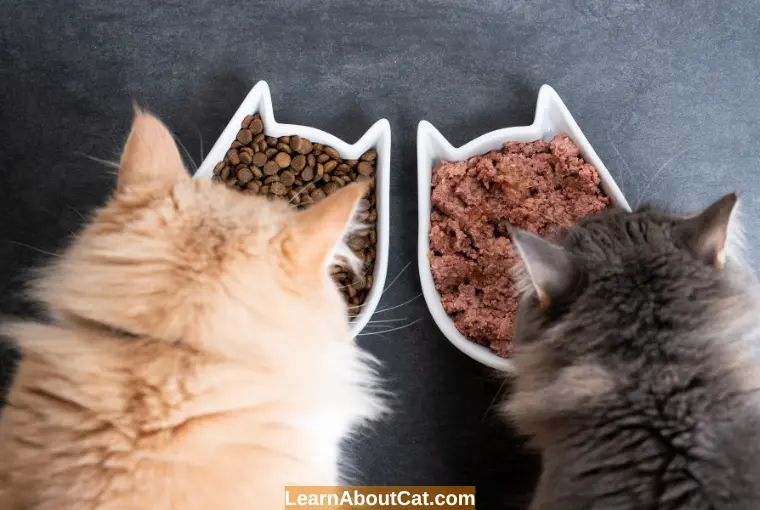
The diets of humans and dogs are very dissimilar from those of cats. It is essential to ensure that your dogs consume food suitable for their species. Cats can only get the protein and amino acids they need from animal sources.
Consuming a lot of “junk food” intended for humans over time can cause weight gain, digestive issues, and even severe health issues in cats. Animal nutritionists developed products and recipes exclusively for cats to meet all of their needs.
Simply put, a single bite of whipped cream won’t hurt your cat, but repeated eating would. Try a few quick, wholesome, and cat-approved alternative snacks instead.
What Other Foods are Prohibited for Cats?
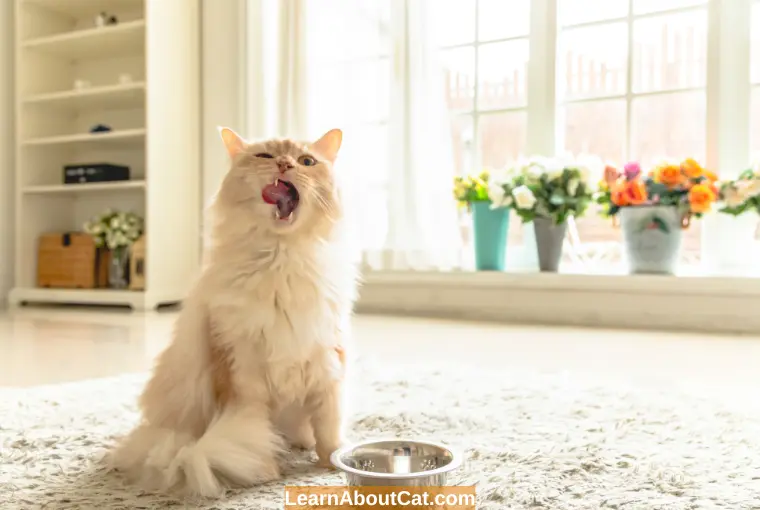
Hopefully, you are aware of why cats shouldn’t eat dairy at this point. Cats should avoid several other human foods besides dairy; dairy is by no means the only food group cats should avoid.
The benefits and drawbacks of feeding cats a variety of lactose-free foods will be discussed.
1. Caffeine
OK, so you’re at the coffee shop, and your cat’s kitty cup already cost you a lot of money. Like most people, you’ll choose a hot cup of green tea or an excellent latte. You like to sip tea and coffee. I assume your cat would as well. Caffeine contains theobromine, a poison found in chocolate. Cats can have tremors and seizures as well.
2. Baking Soda
When your cat eats yeast bread, it may ferment in his stomach and perhaps poison him with alcohol. This can lead to an intestinal rupture in addition to intense anguish.
Make careful to cover the pan or dish with a thick cloth if you’re baking or rolling out dough on the counter. This will safeguard your kitty (and the bread). As an alternative, you can choose to separate the rooms where your cat lives.
3. Grapes and Raisins
Cats can consume a variety of fruits, including melon, blueberries, and bananas, without becoming sick. They cannot consume grapes or raisins, which are dried grapes.
Cats that overindulge in grapes or raisins may get nausea, indigestion, and renal failure. It’s unknown what specifically about grapes and raisins endangers cats.
4. Chocolate
Being an animal lover today and not knowing that chocolate is hazardous for cats and dogs would be extraordinary. Chocolate typically contains the sugars or artificial sweeteners we just spoke about.
Additional components in chocolate have the potential to hurt cats as well as upset their stomachs. Some chocolates contain dairy, which allays the previously mentioned concerns about cats eating chocolate.
Chocolate has theobromine as one of its ingredients. Theobromine, an unpleasant alkaloid, may offer a variety of health benefits, including serving as an antioxidant. This alkaloid cannot be metabolised or digested by our animal friends, including cats and dogs.
5. Alcohol
Cats can be exposed to alcohol in the usual ways, such as by having open cans that leak or mixed drinks left out, but they can also be exposed to it by ingesting foods like vodka spaghetti sauce or tiramisu cake.
Alcohol may be dangerous to cats in even trace amounts. The bloodstream is susceptible to the same adverse effects as alcohol has on individuals. Eating can also significantly reduce body temperature, blood sugar, and blood pressure.
6. Potatoes
Usually, cats can eat cooked potatoes. However, if any component of a potato or potato plant is eaten raw, people may experience nausea, diarrhoea, and vomiting.
Solanine, a chemical found in raw potatoes, is to blame for this. To defend themselves against fungus, potatoes (and other nightshades like tomatoes) create a substance called solanine. This chemical can effectively eliminate pests and fungi. Although cooked potatoes and other nightshades are safer than raw ones because solanine is generally boiled out during cooking, solanine is found in high concentrations in raw potatoes.
7. Onions and Garlic
Multiple staples of the human diet, including the delicious and immensely popular garlic and onions, can be toxic to and even fatal to our cats. Cats can become poisoned by consuming too many foods from the allium family, such as onions, garlic, and other foods.
N-propyl disulfide, an oxidant included in onion and garlic, can damage a cat’s red blood cells, in addition to causing vomiting and diarrhoea in cats. Anaemia, or reduced amounts of red blood cells, is the outcome of attacks on blood cells, which cause them to die. Anaemia can cause fatigue, weakness, and a reduction in appetite.
What Sorts of Snacks are Suitable for Cats?
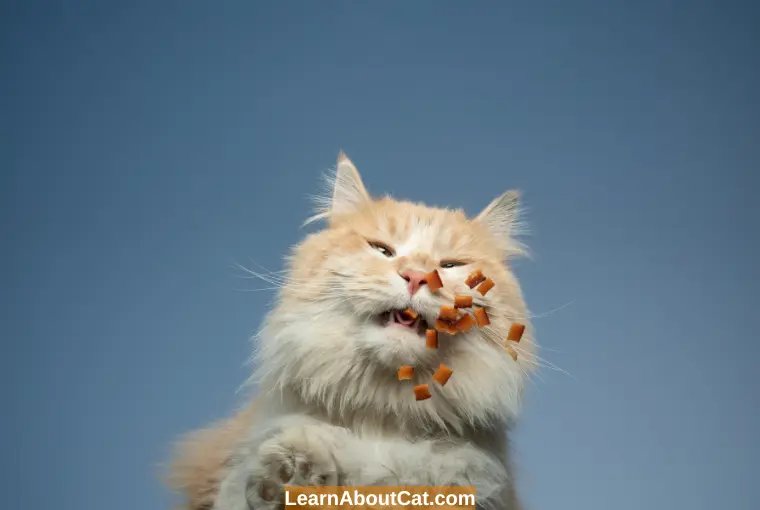
If you find yourself spoiling your cat with treats, don’t worry. Giving your cat a lot of healthy snacks that won’t upset her stomach is an option. Here are a few illustrations.
Eggs: They provide a lot of protein. Eggs must be boiled before being given to your cat, just like meat.
Crumbly cheese: It does not provide as much protein as meat and does include dairy. Cheese is still a far better option if your cat can handle it than whipped cream.
Whole grains: Oats contain a lot of protein and are easy to cook. Cats frequently eat polenta and brown grains as snacks. Many cats love these; however, you might need to mash them beforehand to give them a better texture.
Fish: Omega-3 fatty acids, which are beneficial for a cat’s bones, eyes, kidneys, hair, and heart, are abundant in it. Be careful not to feed your cat any bones to prevent them from getting stuck in its throat. Don’t offer them any of your sushi, either. Fish shouldn’t be eaten uncooked by cats.
Vegetables: Cats seldom eat veggies, but some do. Vitamins can be taken from steamed broccoli, fresh cucumber, spinach, and asparagus. Unfortunately, most cats won’t even try to eat it. Veggie burgers can also be an option to try for felines who eat vegetables.
Meat: Cats are carnivores; therefore meat is typically a wise choice. All permissible choices include chicken, turkey, beef, and lean deli meats. Just remember that feeding your cat any rotting meat might result in health issues.
Whipped Cream and Cats: A relationship
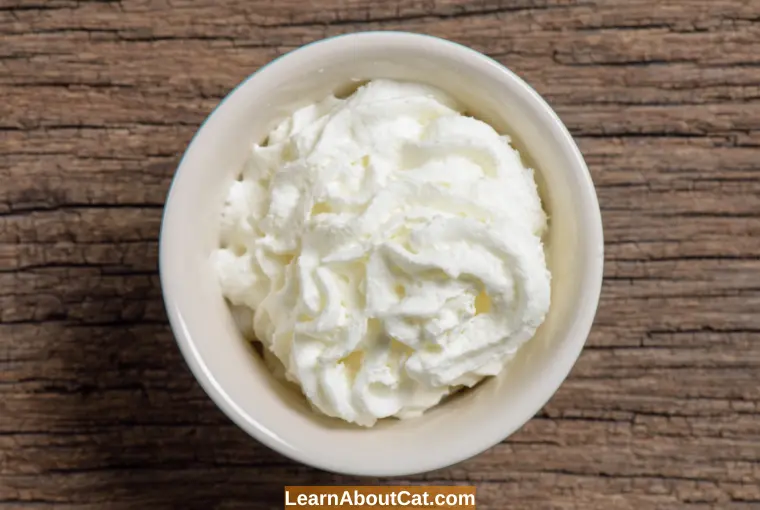
Do you remember the Tom & Jerry episode where Tom blew the whipped cream to capture Jerry, and then Jerry got smothered and covered?
It was adorable. However, if Tom had purposely or mistakenly ingested some of the whipped creams, he would have been in grave condition. Cats can’t tolerate lactose, just like many people. Simply put, their digestive systems can’t break down dairy products like milk and cream.
Dairy products give cats symptoms including nausea, upset stomach, and irregular bowel motions. Strangely enough, cats find anything that tastes fatty to be so alluring and seductive that they would consume whipped cream without hesitation.
Frequently Asked Questions
The Bottom Line on Can Cats Have Whipped Cream
You might want to find out more information on milk-loving cats. They brush on your leg when you remove the milk carton from the refrigerator. As we’ve already mentioned, giving your cat a small amount of milk every now and again won’t likely do any damage.
Lactose-free cat milk is however available if you want to offer your cat a less unpleasant substitute. This will ensure a happy cat and no upset tummies. Additionally, be cautious while choosing healthy snacks for your cat. Limiting your consumption of highly processed foods is crucial. Like us, cats will choose to eat whatever seems delicious.
Related Posts:
Who is Isabella?
My name is Isabella, and I am a dedicated and knowledgeable cat enthusiast. With years of experience caring for cats and a deep love for felines, I made a mission to help other cat lovers navigate the challenges of cat ownership.

